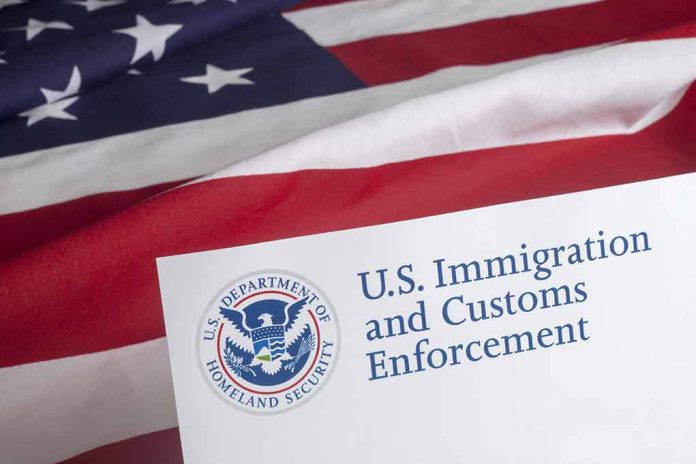
In a sweeping nationwide crackdown, ICE detains over 460 illegal immigrants with serious criminal backgrounds, signaling a return to aggressive enforcement under the Trump administration.
Key Takeaways
- ICE arrested over 460 illegal immigrants linked to serious crimes in a nationwide operation
- Arrests targeted individuals with criminal histories including murder, rape, and child molestation
- The operation spanned multiple states and included nationals from various countries
- The Trump administration plans to increase operations in major U.S. cities, focusing on “sanctuary” jurisdictions
- ICE aims to prioritize public safety threats in its immigration enforcement efforts
Trump Administration Unleashes ICE in Nationwide Sweep
In a dramatic shift from the previous administration’s policies, Immigration and Customs Enforcement (ICE) has launched a massive operation targeting illegal immigrants with serious criminal backgrounds. The crackdown, which resulted in over 460 arrests, marks the beginning of President Donald Trump’s promised tough stance on illegal immigration.
The operation, spanning multiple states, focused on individuals with criminal histories ranging from attempted murder to child molestation. Among those arrested were Jose Barco-Chirino, a Venezuelan national convicted of attempted murder, and Victorino Gaytan-Hernandez, a Mexican national convicted of sexual abuse of a minor.
Trump's ICE racks up hundreds of arrests, including illegal immigrants arrested for horror crimes https://t.co/ru7CxVWyJn
— Fox News (@FoxNews) January 23, 2025
Border Czar Tom Homan Confirms Aggressive Enforcement Strategy
Tom Homan, the incoming White House “border czar,” has been at the forefront of this renewed push for stricter immigration enforcement. In a series of statements, Homan has outlined the administration’s strategy and the initial results of their efforts.
“Right out of the gate it’s public safety threats, those who are in the country illegally that have been convicted, arrested for serious crime,” Homan stated, emphasizing the focus on criminals rather than law-abiding undocumented immigrants. Source
The operation’s scope was expansive, with arrests made in cities across the country, including Denver, Philadelphia, Atlanta, Seattle, Baltimore, and Miami. This widespread action signals the administration’s intent to reverse Biden-era rules that limited ICE’s arrest and deportation priorities.
Targeting Sanctuary Cities and Expanding Operations
The Trump administration has made it clear that “sanctuary” jurisdictions, which limit cooperation with federal immigration officials, will be a primary focus of these enforcement efforts. Cities with large immigrant populations, such as Chicago, are expected to be targeted in upcoming operations.
“ICE is doing their job,” Homan asserted, indicating that the agency is now empowered to carry out its duties without the restrictions imposed by the previous administration. Source
In addition to the arrests, ICE has issued over 420 detainers for individuals arrested for crimes like homicide, sexual assault, and robbery. This move underscores the administration’s commitment to ensuring that dangerous criminals are not released back into communities.
Broader Efforts to Secure the Border
The ICE operations are part of a larger strategy to address illegal immigration and border security. President Trump has signed an executive order to make homeland security a core mission of the Department of Defense, and the administration is deploying 1,500 additional active-duty troops to the southern border.
“President Trump signed an executive order — 1,500 additional troops to the United States southern border. This comes off of his day one action… to direct the Department of Defense to make homeland security a core mission of the agency,” explained Karoline Leavitt, highlighting the administration’s multifaceted approach to border security. Source
As the Trump administration continues to implement its immigration policies, debates over the balance between enforcement and humanitarian concerns are likely to intensify. However, for supporters of stricter immigration control, these initial actions represent a significant step towards fulfilling campaign promises and prioritizing national security.






















